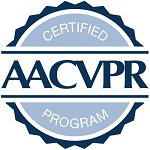
Cardiac Rehabilitation
UHS Cardiac Rehabilitation program provides a multi-faceted approach to improve cardiovascular health and overall well-being.
The program begins with an initial rehabilitation consult provided to patients who have been either diagnosed with a heart condition, or to patients in the hospital recovering from a cardiac event or surgery.
Cardiac rehabilitation is a comprehensive, medically-supervised exercise and education program for those who have heart conditions.
Each program is individually designed to meet the needs of the patient and promote the fullest possible recovery, and includes on-going updates to a patient’s cardiologist or primary provider. This phase typically lasts 12-18 weeks and is covered by most insurances. The American Association of Cardiovascular and Pulmonary Rehabilitation (AACVPR), maintaining the highest level of commitment and care to our cardiac patients, nationally certify the UHS Cardiac Rehabilitation programs at Binghamton General Hospital and Delaware Valley Hospital.
|
UHS Cardiac Rehabilitation - Binghamton General Hospital Phelps Hall Gym, 20 Mitchell Avenue |
Cardiac Rehabilitation Program (Phase 2)
Supervision during exercise soon after a heart attack, open-heart surgery, angioplasty/stenting or other heart-related procedures is very important in minimizing the risk of preventable problems during exercise.
The UHS Cardiac Rehabilitation Program is a comprehensive, medically supervised exercise and education program for patients who have experienced the above-mentioned cardiac problems/procedures. It is an individualized program designed to promote the fullest possible recovery, prevent further cardiac complications, and provide education to improve one’s understanding of heart disease.
Other Benefits Include
- Improved Cardiovascular Health: Enhance your heart's efficiency and reduce the risk of future heart events.
- Increased Physical Fitness: Develop a customized exercise plan to boost your stamina and overall physical health.
- Better Lifestyle Choices: Receive education and support to adopt healthier habits, including diet, exercise, stress management and smoking cessation.
- Better Control of Blood Pressure: Decreased reliance on medications
- Reduced Risk of Hospitalization: Lower the chances of future cardiac issues and related hospital visits.
- Emotional Support: Benefit from counseling and support to navigate the emotional aspects of heart disease and recovery.
- Lipid Management: Increased HDL (good) cholesterol, Decreased LDL (bad) cholesterol
Timeline to Start Cardiac Rehab
Referral & Initial Consultation (Weeks 1-2):
- Referral: Obtain a referral from your cardiologist or primary care physician after cardiac problem/procedure.
- Initial Consultation: Schedule an appointment with our cardiac rehab team to discuss your medical history and rehabilitation goals.
Pre-Rehabilitation Assessment (Weeks 2-4):
- Medical Evaluation: Complete a thorough evaluation, including a health history exam, review of blood tests, and cardiac rehab specific assessments.
- Fitness Assessment: Assess your current physical condition to tailor your exercise plan.
- Program Planning: Individualized Plan Development: Work with our team to create a personalized rehabilitation plan, including exercise, nutrition, and educational components.
- Set Goals: Define specific, measurable goals for your rehabilitation journey.
Program Start (Weeks 3-4 and Beyond):
- Start of Exercise: An individualized exercise prescription will be created by our exercise physiologists at the beginning of your cardiac rehab program according to the individualized plan developed for you.
- Ongoing Adjustments: Attend regular follow-up appointments to track progress and make necessary adjustments to your program.
Program Duration:
- Typically 12-16 Weeks (Up to 36 visits): The duration may vary based on individual needs and progress.
- Long-Term Maintenance: Guidance on how to maintain your heart health independently.
Covered Diagnoses
Our Cardiac Rehabilitation Program is designed to support individuals with a range of cardiovascular conditions, including:
- Post-Heart Attack (Myocardial Infarction)
- Coronary Artery Bypass Grafting (CABG)
- Percutaneous Coronary Intervention (PCI)
- Heart Valve Replacement/Repair
- Heart Failure
- Stable Angina
If you have a heart condition not listed, please contact us to discuss how our program may still benefit you.
Our Cardiac Rehabilitation Team
- Cardiologists: Specialists in heart health who oversee your treatment and rehabilitation progress.
- Exercise Physiologists: Experts in creating safe and effective exercise programs tailored to your heart condition.
- Nurses: Care providers with an extensive knowledge in the field of cardiology who monitor your health, provide support, and ensure your safety throughout the program.
Enrollment and Cost
Patients are accepted into this program by physician referral. Since UHS Binghamton General Cardiac Rehabilitation is a medically accepted and supervisor program prescribed by your physician, it is covered by most insurance contracts for most cardiac diagnoses. Our team will help you determine your insurance coverage at your initial intake appointment which is done at no cost to you.
Program Hours and Facility
Exercise sessions are available Monday through Friday from 7:00am to 4:00pm. Patient may register to attend two or three sessions per week. Determination of session dates and times occurs upon the initial intake appointment. Please report to your session 10-minutes prior to the scheduled start time.
The Cardiac Rehabilitation Gym is located in Phelps Hall, the first large (5 Story) brick building on the right, down the street from the hospital’s main entrance. It is an air-conditioned facility complete with a wide range of exercise equipment.
Weather
In case of a State of Emergency, Cardiac Rehabilitation will be closed.
UHS Cardiac Rehabilitation - Chenango Memorial Hospital179 N. Broad Street |
Cardiac Rehabilitation (Phase 2) and Pulmonary Rehab services are offered at UHS Chenango Memorial Hospital's Cardiology Center. Cardiac Rehab, also known as Phase 2 Rehab, is a Nurse monitored, low-pace exercise program in which heart care patients wear wireless heart monitoring devices with constant nurse supervision. Pulmonary Rehab is designed to help those with breathing and lung issues recover at a controlled and monitored pace. Education and lifestyle modifications are part of the recovery process.
Staff member Devan Boutin, Cardiac and Pulmonary Rehabilitation Supervisor, is specially trained to work with rehab patients and help them through the process of getting back to a comfortable and safe lifestyle.
Benefits:
- Better management of your heart’s responses to exercise
- Improved cardiac stability during physical activity
- Better blood pressure control; Increased HDL (good) cholesterol and decreased LDL (Bad) cholesterol
- Improved physical fitness
- Weight loss
- Decreased dependence on certain medications
- Increased self-confidence and sense of well being
- Ongoing motivation and encouragement from our caring staff
- Support system for those with heart disease
Our Cardiac Rehabilitation Team
The Cardiac Rehabilitation Team includes an Advanced Cardiac Life Support credentialed, registered nurse; a physical therapist and is physician-supervised.
Enrollment
Enrollment and Cost Patients are accepted into this program by physician referral. Eligible participants will meet with a Cardiac Rehabilitation Registered Nurse for an initial interview. An individualized exercise prescription will then be developed by one of our Physical Therapists. Classes are offered 2x or 3x/week. Days and times will be determined at the time of initial interview and are based on availability. Since UHS Cardiac Rehabilitation is a medically accepted and supervised program prescribed by your doctor, it is covered by most insurance contracts for most cardiac diagnoses. Our team will help you determine your insurance coverage at your initial intake appointment.
Program and Hours
Exercise sessions are flexible with your schedule and are usually conducted in one hour intervals. Participants may attend 2 or 3 times each week. The program generally runs for 12 weeks.
|
UHS Cardiac Rehabilitation - Delaware Valley Hospital 1 Titus Place |
UHS Cardiac Rehabilitation at UHS Delaware Valley Hospital is nationally certified by AACVPR, maintaining the highest level of commitment and care to our cardiac patients.
The Cardiac Rehabilitation Phase II Program is a comprehensive medically supervised exercise and education program for patients who have had a heart attack, open heart surgery, valve replacement surgery, chronic heart failure (CHF), angina, angioplasty/stents or other major heart problems.
Supervision during exercise soon after a cardiac diagnosis, event or procedure is very important in minimizing the risk for preventable problems during exercise and in building the patient’s confidence in their ability to exercise.
The program is individualized and designed for each patient to promote the fullest possible recovery from heart disease. The Phase II program focuses on improving your heart’s status while enhancing your understanding of your condition and building confidence.
Enrollment
Patients are accepted into this program by primary or specialty physician referral. Eligible participants will meet with a Cardiac Rehabilitation Registered Nurse for an initial interview. An individualized exercise program will be developed by one of our Physical Therapists and the nurse.
Classes are offered 2x or 3x/week. Days and times will be determined at the time of initial interview and are based on availability. Since UHS Cardiac Rehabilitation is a medically accepted and supervised program prescribed by your doctor, it is covered by most insurance contracts for most cardiac diagnoses. Our team will help you determine your insurance coverage at your initial intake appointment.
Cardiac Rehab Phase III may be available to patients completing Cardiac Rehab Phase II program.
UHS News
-
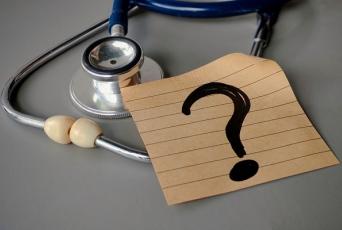 Know where to go for your medical concernFebruary 16, 2026
Know where to go for your medical concernFebruary 16, 2026It can be tough to distinguish where to go for medical care when your symptoms feel unbearable, and your primary care provider is unavailable. Here are some key differences to help you decide.
-
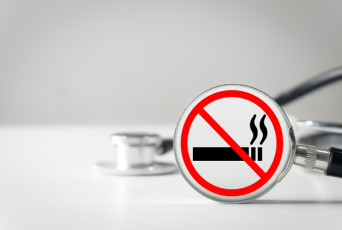 UHS supports tobacco cessation in partnership with St. Joseph's HealthFebruary 13, 2026
UHS supports tobacco cessation in partnership with St. Joseph's HealthFebruary 13, 2026UHS is pleased to announce its continued collaboration with the Central New York Regional Center for Tobacco Health Systems at St. Joseph's Health. Through this partnership, UHS has strengthened its tobacco-dependence treatment policy, aligning it with the Public Health Service Clinical Practice Guidelines.
-
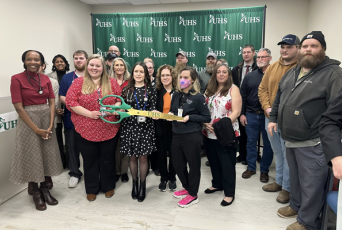 UHS Pediatrics Upper Front Street holds ribbon-cutting ceremonyFebruary 13, 2026
UHS Pediatrics Upper Front Street holds ribbon-cutting ceremonyFebruary 13, 2026On Thursday, February 12, UHS hosted a ribbon cutting to celebrate the opening of UHS Pediatrics Upper Front Street. The practice, which previously served patients on Chenango Bridge Road, welcomed its first patients at the new location on February 2.
-
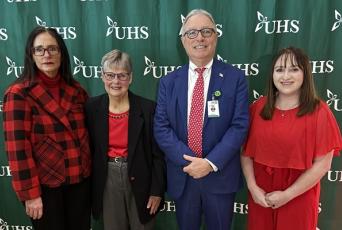 Spotlighting heart health awareness with ‘Go Red for Women’ campaignFebruary 10, 2026
Spotlighting heart health awareness with ‘Go Red for Women’ campaignFebruary 10, 2026People across the country – and throughout the Southern Tier – wore red on Friday, February 6, to raise awareness of heart disease in women as part of National Wear Red Day, a cornerstone of the American Heart Association’s Go Red for Women campaign.



